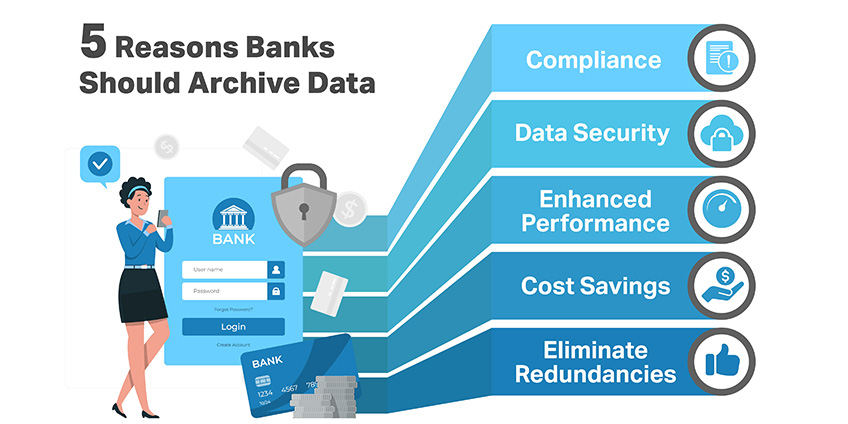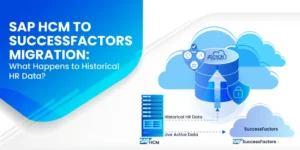Like any other industry handling sensitive data—medical records, financial statements, personally identifiable information—the banking industry must comply with industry regulations to ensure it protects this data. While compliance is a top priority, it is not the only reason financial institutions should consider a data archival solution to archive business-complete data.
Not sure how your bank can benefit from enterprise data archival? Here are a few ways:
- Compliance with the highly regulated industry laws
- Mitigation of data loss, leaks, or unintentional deletion
- Avoiding the financial consequences of non-compliance
- Improved database performance and decreased downtime
- Cost savings from reducing the volume of data you maintain and provide licensing for
- Access to high volumes of data to glean insights that allow for data-driven decision-making
- Consolidated applications and systems after mergers and acquisitions
- Faster backup and recovery times which means faster RTO/RPO in the event of disaster recovery
- Queries execute faster and applications can react faster.
Read on to learn more about this wide range of benefits from enterprise data archival for the banking industry.
1. Compliance is non-negotiable in data archival
With so much personally identifiable and sensitive information processed through banks every day, privacy laws and regulations are crucial for protecting your customers and their data. Mandates were put in place to ensure data privacy—and non-compliance can cost you… in many ways.
Most obvious are the financial hits you take when your financial institution fails to comply—even unintentionally—with industry regulations. Fines and penalties from a single non-compliant event can add up to millions of dollars. In 2020, banks everywhere were fined over $14B for non-compliance. And the United States accounted for nearly 80% of those fines.
Non-compliance can also cause disruptions in business operations, damage your reputation, and lead to lost revenue. Effective data archival management can help ensure compliance in a few ways:
- Using a data archival platform like Archon Data Store lets you set retention periods for your data to ensure you keep data for as long as necessary without over-preserving data. Once your retention period expires, the data archival platform will let you know your data is up for defensible deletion.
- A data archival policy outlines what records you need to keep for legal, business, and government compliance.
- Following a data archival management plan can make sure data remains immutable.
The bottom line is that compliance is non-negotiable; putting together a data archival policy and finding an enterprise data archival solution can make compliance more effective and easier to follow.
2. Minimize your risk and protect your critical data
You generate millions of records and terabytes of customer and business data. With desirable information like bank account numbers, malicious actors target financial institutions and all that data for ransomware attacks or full-on data breaches.
However, even if you are not the victim of a ransomware attack, you could unintentionally leak sensitive information, such as transaction data, proprietary information, or confidential customer details that put compliance and your reputation at risk.
Data archival solutions minimize these risks by archiving business-complete data in a secure storage database. With retention policies, you can also protect against accidental data deletion and ensure smooth audit processes.
We suggest a database that offers enhanced features to prioritize security, like access permissions to restrict who can access or modify data or built-in retention policies that prevent anyone from deleting data before the set end date.
3. Prioritize performance while archiving
Are your systems struggling with the sheer volume of data your bank produces or unable to handle an increased load from a merger and acquisition? The bigger your database, the slower your system response time—impacting performance. The best way to improve your database performance is to archive your data and reduce the amount of data sitting in the system.
A data archival platform allows you to lessen the data load your system needs to maintain and manage to speed up response time and improve overall performance. You can access and analyze data without delay or downtime.
As a bonus, you can quickly access the historical data in your archive to gather actionable insights that allow you to make smarter business decisions—all without delay.
4. A more cost-effective option
Managing and maintaining data is expensive, especially in the banking industry where you process millions (if not billions) of daily transactions. And as the volume increases, so do your costs.
These expenses include:
- Infrastructure, like hardware to process the data
- Licensing fees
- Storage fees based on how much data you store in your database
- Costs associated with managing data, like your IT team and data management experts
With strict regulations and compliance as a top priority, we understand being anxious to get rid of data; this is why data archiving is the best solution. Instead of continuously adding data on top of data and overworking your databases, you can archive your historical data and save money by lessening the amount of data you are managing and storing in your in-memory database.
Archiving cost-effective databases should be a key tenet of your data archival policy.
Here’s why:
- You free up costly tier 1 storage, making room for more crucial data without the need to purchase more storage
- You can tier your storage in an archival database to lower costs even further
- As you decrease your data volume, you can also cut your licensing fees
On top of cost savings, if you have a quality data archival platform like Platform 3 Solutions’ Archon Data Store, you can quickly and easily access your business-complete and historical data without paying for prime tier 1 storage.
5. Consolidate your applications and eliminate redundancies
You have a core banking system and dozens, or in some cases, hundreds of applications on top of that. You might also have some data stored in legacy systems, duplicate applications from a merger or acquisition, or multiple tech stacks that make data archiving feel impossible.
But with enterprise data archival, you can eliminate redundancies and applications to streamline your data archiving while reducing costs. Using Archon ETL and Archon Data Store, we have helped several banks pull the data from their legacy systems and archive it—no data loss and minimal downtime.

Ready to realize the benefits of effective data archival management?
Whether you are looking for cost savings and improved system performance or simply want to decommission duplicate applications from a merger and acquisition, data archiving delivers.Our team at Platform 3 solutions has years of experience working with banks to archive their data and choose the database infrastructure that will best serve their business goals.
We use data archival platforms like Archon ETL and Archon Data Store to extract transform and load your data into a central database complete with storage tiers, reporting, and more. So, if you are ready to archive, contact us to learn how we can work together.
Platform 3 Solutions is a global leader in end-to-end legacy application migration and retirement solutions. Platform 3 empowers secure and seamless transitions of data and applications, eliminates technology debt, and delivers the ROI to invest in technology modernization.



